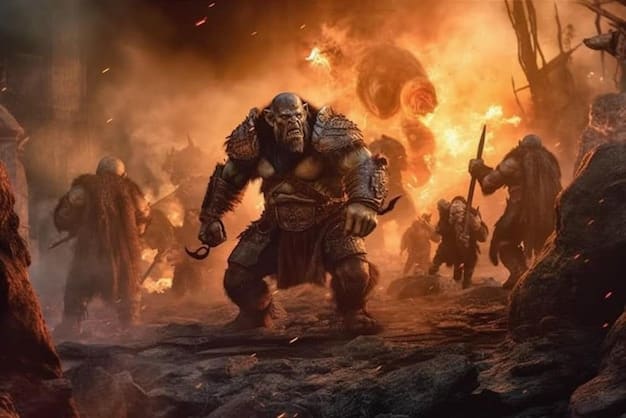Cable Originals That Defined the 2010s: A Look Back

Cable originals from the 2010s redefined television, offering innovative storytelling and memorable characters; shows like *Breaking Bad*, *Game of Thrones*, and *Mad Men* captured audiences and garnered critical acclaim, significantly influencing the landscape of television programming.
The 2010s were a golden age for television, particularly for cable networks that pushed boundaries and delivered some of the most groundbreaking shows in television history. Looking back, the cable originals that defined a decade not only entertained but also significantly influenced storytelling, production quality, and the very way we consume television.
The Rise of Cable Television
The 2010s marked a turning point for cable television, as it transitioned from being an alternative to broadcast networks to a primary source of high-quality, original programming. Several factors contributed to this rise, including increased investment in production, the freedom to explore mature themes, and a growing audience eager for complex storytelling.
Investment in Quality Production
Cable networks began allocating significant budgets to their original series, allowing for higher production values, elaborate sets, and top-tier talent. This investment paid off as these shows gained critical acclaim and attracted wider audiences.
Creative Freedom and Mature Themes
Unlike broadcast networks, cable channels faced fewer restrictions on content, enabling them to delve into darker, more complex themes and character development. This freedom allowed for more nuanced and thought-provoking storytelling.

Here are some critical aspects which defined the decade for cable television:
- Increased risk-taking: Cable channels were more willing to experiment with unconventional storylines and formats.
- Character-driven narratives: Many successful shows focused on deeply flawed and complex characters, allowing for richer storytelling.
- High production values: The visual and technical quality of cable shows rivaled that of feature films.
In conclusion, the rise of cable television in the 2010s was driven by a combination of increased investment, creative freedom, and a hunger for high-quality, character-driven narratives, setting the stage for a decade of groundbreaking original series.
Breaking Bad: Redefining Anti-Hero Narratives
One of the most influential cable originals of the 2010s was undoubtedly *Breaking Bad*. Created by Vince Gilligan, the series follows Walter White, a high school chemistry teacher who turns to cooking methamphetamine to secure his family’s financial future. The show is celebrated for its compelling characters, intricate plot, and its exploration of morality and the consequences of one’s choices.
Character Development
*Breaking Bad* stands out for its exceptional character development. Walter White’s transformation from a meek teacher to the ruthless Heisenberg is both fascinating and disturbing. Other characters, such as Jesse Pinkman, Skyler White, and Hank Schrader, are equally well-developed and contribute to the show’s rich narrative tapestry.
Plot Complexity
The series is renowned for its intricately plotted storylines, filled with twists, turns, and unexpected consequences. Each season builds upon the previous one, creating a cohesive and gripping narrative arc.
The impact of *Breaking Bad* on television is undeniable:
- Popularized the anti-hero: Walter White became one of television’s most iconic anti-heroes, paving the way for similar characters in other shows.
- Elevated the prestige drama: The show’s critical acclaim and popularity helped solidify the status of prestige dramas on cable television.
- Inspired spin-offs: The success of *Breaking Bad* led to the creation of the successful spin-off series, *Better Call Saul*.
In summary, *Breaking Bad* not only entertained audiences but also redefined anti-hero narratives and elevated the prestige drama genre on cable television, leaving an indelible mark on the medium.
Game of Thrones: Fantasy Epic on a Grand Scale
*Game of Thrones*, based on George R.R. Martin’s *A Song of Ice and Fire* novels, became a global phenomenon and a defining show of the 2010s. Known for its sprawling cast, intricate political intrigue, and stunning visuals, the series brought fantasy to a mainstream audience in a way never before seen.
Visual Spectacle
*Game of Thrones* was renowned for its impressive special effects, detailed costumes, and breathtaking landscapes. The show’s visual spectacle set a new standard for television production.
Complex Storytelling
With its multiple storylines, intricate family dynamics, and morally ambiguous characters, *Game of Thrones* offered a level of complexity rarely seen on television. The show challenged viewers to invest in its world and characters.

Key accomplishments of *Game of Thrones* include:
- Global phenomenon: The show attracted a massive global audience, becoming one of the most-watched television series in history.
- Critical acclaim: *Game of Thrones* won numerous awards, including multiple Primetime Emmy Awards for Outstanding Drama Series.
- Cultural impact: The series influenced popular culture, inspiring countless memes, parodies, and discussions about its themes and characters.
Ultimately, *Game of Thrones* redefined the fantasy genre on television, demonstrating that complex, visually stunning, and morally ambiguous narratives could captivate a global audience, paving the way for other ambitious fantasy series.
Mad Men: A Nostalgic Look at the 1960s
*Mad Men*, created by Matthew Weiner, transported viewers back to the 1960s, offering a stylized and thought-provoking look at the advertising industry and American culture. The series was lauded for its historical accuracy, nuanced characters, and its exploration of themes such as identity, ambition, and the changing social landscape.
Attention to Detail
*Mad Men* was meticulous in its recreation of the 1960s, from the costumes and set design to the cultural attitudes and social issues of the time. This attention to detail created an immersive viewing experience.
Character-Driven Drama
Centered around the enigmatic Don Draper, *Mad Men* explored the complexities of its characters, delving into their personal struggles and motivations. The show’s ensemble cast was equally compelling, each character contributing to the show’s rich tapestry.
Why *Mad Men* Still Resonates:
- Nostalgia and escapism: The show offered viewers a glimpse into a bygone era, appealing to a sense of nostalgia and escapism.
- Exploration of universal themes: *Mad Men* tackled timeless themes such as identity, ambition, and the pursuit of happiness.
- High production values: The show’s meticulous attention to detail and stylish visuals made it a standout series.
In conclusion, *Mad Men* distinguished itself on cable television through its nostalgic look at the 1960s, coupled with its character-driven drama, making it a critically acclaimed cable original that still resonates with audiences today.
The Walking Dead: Zombie Horror Goes Mainstream
*The Walking Dead*, based on the comic book series by Robert Kirkman, brought zombie horror to the forefront of mainstream television. The series combined thrilling action sequences with complex character dynamics, exploring themes of survival, morality, and the human condition in a post-apocalyptic world.
Intense Action and Suspense
*The Walking Dead* was known for its intense action sequences and suspenseful atmosphere, keeping viewers on the edge of their seats. The show’s zombie effects and makeup were also groundbreaking.
Character-Based Storytelling
While set in a zombie-infested world, *The Walking Dead* focused on the human characters and their relationships, exploring how they adapted to the new reality and made difficult choices in order to survive.
Key Takeaways from *The Walking Dead*:
- Popularized zombie horror: The show helped bring zombie horror into the mainstream, paving the way for other zombie-themed entertainment.
- Created a loyal fanbase: *The Walking Dead* cultivated a dedicated and passionate fanbase, who followed the show through its many seasons.
- Expanded the universe: The success of the series led to spin-offs, video games, and other media, expanding the *Walking Dead* universe.
In summary, *The Walking Dead* achieved a milestone in cable TV by making zombie horror broadly popular, setting a standard for action and suspense while exploring human struggles in extreme conditions.
Other Notable Cable Originals of the 2010s
While *Breaking Bad*, *Game of Thrones*, *Mad Men*, and *The Walking Dead* are among the most iconic cable originals of the 2010s, many other shows deserve recognition for their contributions to the television landscape. These series offered diverse perspectives, unique storytelling approaches, and critical acclaim.
Homeland: Political Thriller
*Homeland*, starring Claire Danes and Damian Lewis, was a gripping political thriller that explored themes of terrorism, espionage, and mental illness. The show was praised for its timely storylines and compelling performances.
Downton Abbey: Period Drama
*Downton Abbey*, a British period drama set in the early 20th century, captivated audiences with its lavish costumes, intricate storylines, and ensemble cast. The show offered a glimpse into the lives of the aristocratic Crawley family and their servants.
Here are other mentions, that were notable in the cable platform during the 2010s:
- American Horror Story: An anthology horror series that reinvented itself each season, exploring different themes and settings.
- Sherlock: A modern adaptation of Arthur Conan Doyle’s Sherlock Holmes stories, starring Benedict Cumberbatch and Martin Freeman.
- Orphan Black: A science fiction thriller about a woman who discovers she is one of many clones.
In conclusion, beyond the giants in cable TV, other series expanded the horizons of storytelling and viewership, solidifying the decade as a period of innovation and creative achievements in cable television.
The Legacy of 2010s Cable Originals
The cable originals of the 2010s left a lasting legacy on the television industry. These shows raised the bar for storytelling, production quality, and character development, influencing not only cable networks but also streaming services and broadcast television.
Influence on Streaming Services
The success of cable originals demonstrated the demand for high-quality, original programming, paving the way for the rise of streaming services like Netflix, Amazon Prime Video, and Hulu. These services invested heavily in original content, following the model established by cable networks.
Impact on Storytelling
The cable originals of the 2010s pushed the boundaries of storytelling, exploring complex themes, morally ambiguous characters, and unconventional narrative structures. This influence can be seen in many of the shows being produced today.
The Cable Originals’ Legacy
- Elevated television as an art form: Cable originals helped elevate television to the level of an art form, attracting top talent and garnering critical acclaim.
- Changed viewing habits: The success of these shows contributed to the shift away from traditional broadcast television towards on-demand viewing.
- Created a golden age of television: The 2010s are often referred to as a golden age of television, thanks in large part to the cable originals that defined the decade.
To conclude, the impact of the cable originals from the 2010s is undeniably profound, as they have enhanced the standards for storytelling, shaped streaming services, and solidified a revolutionary period in television history.
| Key Point | Brief Description |
|---|---|
| 🎬 Rise of Cable TV | Cable becomes a primary source for original, high-quality content. |
| 🧪 Breaking Bad | Redefined anti-hero narratives and prestige dramas. |
| 🐉 Game of Thrones | Fantasy epic achieves global phenomenon status with visual spectacle. |
| 👔 Mad Men | Nostalgic look at the 1960s through character-driven drama. |
FAQ
▼
Cable originals in the 2010s stood out due to their willingness to take creative risks, produce high-quality content, and explore complex themes, all of which attracted a dedicated audience.
▼
Breaking Bad popularized the anti-hero narrative, showcasing character transformation over time, and set the standard for prestige dramas on cable platforms and eventually streaming services
▼
The key appeal of Game of Thrones was its grand scale, encompassing not only visual spectacles and intense action, but complex story lines and intriguing political dynamics.
▼
Mad Men evoked nostalgia through meticulous set design, accurate representation of cultural attitudes of the 1960s, with storylines that explored universal themes of identity and ambition.
▼
Cable originals demonstrated a demand for original programming, which led to streaming services investing heavily in their own exclusive shows, transforming how television content is created and consumed.
Conclusion
In conclusion, the cable originals that defined a decade, specifically the 2010s, significantly transformed the television landscape, setting new standards for storytelling, character development, and production quality. Shows like *Breaking Bad*, *Game of Thrones*, *Mad Men*, and *The Walking Dead* not only captured audiences worldwide but also influenced the rise of streaming services and the way television is created and consumed today, leaving a lasting legacy that continues to shape the industry.





